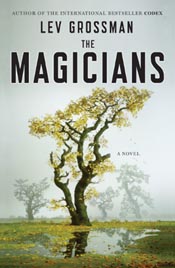 Quentin Coldwater, math genius, card/coin trickster, and general malcontent (like any NYC high school senior) never got over his first great love: the series of (fictional) children's fantasy novels Fillory and Further, which chronicle the adventures of a set of British siblings who discover a Narnia-esque magical world. If only, Quentin thinks, he, too, could escape from the prison of reality and live forever in blissful fantasy. When Quentin discovers that magic is real and is accepted into an elite, secret college of magic, he thinks all his dreams have come true. And indeed, for a while, they do. Breakbills is a Hogwarts for the young adult, full of enchantment and alcohol, and as he rapidly acquires astonishing new powers, Quentin starts to believe that he has found a true home and a true family. But like all good things, the dream doesn't last and, once he and his comrades graduate, Quentin must finally come to grips with the world, with the limits of magic, and with himself. Ultimately Quentin's journey leads him to Fillory itself and he learns the dark secret behind its story, and that is is not the idyllic, Edenic escape that he once believed it to be.
Quentin Coldwater, math genius, card/coin trickster, and general malcontent (like any NYC high school senior) never got over his first great love: the series of (fictional) children's fantasy novels Fillory and Further, which chronicle the adventures of a set of British siblings who discover a Narnia-esque magical world. If only, Quentin thinks, he, too, could escape from the prison of reality and live forever in blissful fantasy. When Quentin discovers that magic is real and is accepted into an elite, secret college of magic, he thinks all his dreams have come true. And indeed, for a while, they do. Breakbills is a Hogwarts for the young adult, full of enchantment and alcohol, and as he rapidly acquires astonishing new powers, Quentin starts to believe that he has found a true home and a true family. But like all good things, the dream doesn't last and, once he and his comrades graduate, Quentin must finally come to grips with the world, with the limits of magic, and with himself. Ultimately Quentin's journey leads him to Fillory itself and he learns the dark secret behind its story, and that is is not the idyllic, Edenic escape that he once believed it to be.This book was thrust into my hands by my brother, who said that I "had to read it Right Now," and I devoured it in three days. Grossman is, forgive the pun, a magical writer. The Magicians combines the alluring fantasy of Harry Potter with the dark complexities of The Secret History. Grossman's prose is alternately lush and austere and always evocative and heartrending. Despite all the spells and sparkles, The Magicians is at the core a poignant coming of age story. Quentin is an imperfect hero (actually he's kind of a shit) and much of the book centers on his misguided search for happiness and escape. Like a small child, he indulges in the sort of magical thinking that dictates that Something Else will just Happen and instantly solve all his problems for him and he consistently refuses to realize his own agency and responsibility. As the Dean of Breakbills pointedly asks, "can a man who can cast a spell ever really grow up?"
Whether or not Quentin ever does fully grow up is debatable, but over the course of the book, as Quentin journeys through college, across the globe, and ultimately through Fillory itself, he outgrows his childish wish to escape forever and learns to start living. In this way, Fillory functions as a powerful metaphor for childhood and The Magicians as an allegorical account of adolescence--human adolescence. There are all kinds of magic, as Quentin himself says: "In a way fighting was like using magic. You said the words, and they altered the universe. By merely speaking you could create damage and pain, cause tears to fall, drive people away, make yourself feel better, make your life worse." We may not learn the kind of sorcery that Quentin learns at Breakbills--to levitate a marble, to transform into a fox--but as we grow up we learn an equally powerful magic: the magic of words and thoughts, the magic of belief, the magic of love.
When I turned the last page, I felt conflicted; I wasn't sure if I really loved it as much as I had in the beginning. I wasn't fully happy with the inevitable reality of the conclusion with all its complications and imperfections. Why couldn't everything have just continued to be blissful and beautiful? (This probably has something to do with why The Prisoner of Azkaban is my favorite Harry Potter book.) Why must there be mistakes? Why must there by heartbreak? I wished that the dream of magic, of Breakbills, and of Fillory could have lasted forever and not been marred by the harsh realities of love, loss, and regret that exist in all worlds, magical or not. But, of course, that is precisely the point of the book: nothing is perfect nor can wishing make it so, and, in the end, even Peter Pan has to grow up. A truly magical and beautiful book in every regard.








